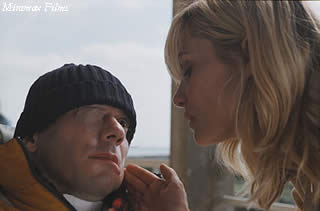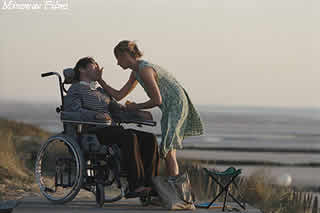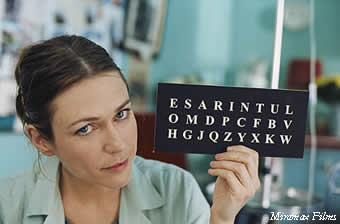 The Diving Bell and the Butterfly is based on true story of Jean-Dominique Bauby. The film begins by introducing Jean-Do who has become a vegetable after having a stroke. Unable to move or speak Jean-Do begins to pity what has become of his life but soon comes to the realization that living doesn’t have to end simply because he has been confined to exist within the walls of a hospital. Instead he begins to draw on his imagination, his memories, and his desires; they become a sort of exit from his body, here he can do what he wants and reminisce on all the things he did and could have done differently. As his perspective on life begins to shift Jean-Do decides to embark on the courageous task of writing a book about his perception of life in his vegetative state and ultimately the fundamental nature of the human spirit. Clearly his condition prevents him from physically writing therefore he learns to communicate via his eyelid and with the help of a group of loving and patient women he is well on his way to finishing his book.
The Diving Bell and the Butterfly is based on true story of Jean-Dominique Bauby. The film begins by introducing Jean-Do who has become a vegetable after having a stroke. Unable to move or speak Jean-Do begins to pity what has become of his life but soon comes to the realization that living doesn’t have to end simply because he has been confined to exist within the walls of a hospital. Instead he begins to draw on his imagination, his memories, and his desires; they become a sort of exit from his body, here he can do what he wants and reminisce on all the things he did and could have done differently. As his perspective on life begins to shift Jean-Do decides to embark on the courageous task of writing a book about his perception of life in his vegetative state and ultimately the fundamental nature of the human spirit. Clearly his condition prevents him from physically writing therefore he learns to communicate via his eyelid and with the help of a group of loving and patient women he is well on his way to finishing his book.
Julian Schnabel’s film about Jean-Do is a different kind of biopic; instead of going the traditional route that many other films of the same genre go through Schnabel does something more experimental. He begins the film by making the audience see through Jean-Do’s eyes, and tries to create a mood that also reflects what Jean-Do feels at that point in his life. Schnabel does this by making the camera capture only what Jean-Do would probably be seeing from his eye level, in addition the camera is blurry and shaky this too is done to convey his mood. Evidently Schnabel took risks with the camera to make this film distinctive but sadly his risks don’t entirely deliver.
many other films of the same genre go through Schnabel does something more experimental. He begins the film by making the audience see through Jean-Do’s eyes, and tries to create a mood that also reflects what Jean-Do feels at that point in his life. Schnabel does this by making the camera capture only what Jean-Do would probably be seeing from his eye level, in addition the camera is blurry and shaky this too is done to convey his mood. Evidently Schnabel took risks with the camera to make this film distinctive but sadly his risks don’t entirely deliver.
The camera work here, (though more distinctive to that of most films) isn’t able to capture Jean-Do to his fullest extent. Schnabel seems to be trying to hard to express Jean-Do’s state of mind and view of himself and his surroundings. His intention was obviously to connect the audience to Jean-Do but unfortunately his choice of camera technique somewhat defeats the purpose. Yes on some level the cinematography does work to the films advantage. It mainly works to set the overall mood of the film; it plays as if it were in a sort of surreal setting and this works too because it captures Jean-Do’s imagination but it is the overbearing use of this camera technique which ultimately makes it less effective. Fortunately everything else in the film is greatly executed.
 The performances here are the best thing in this film. Mathieu Amalric’s portrayal of Jean-Do is one of the best performances out of the bunch. He is very convincing as a person who has gone from someone who was on top of the world to someone whose life turned upside down in an instant. Though he hardly moves his body or his lips he is still able to communicate different emotions and his narration of the film is very authentic. Max Von Sydow also gives a great performance as Papinou, Jean-Do’s father. Even if his screen time is minimal his performance doesn’t show it. He plays a man who in his younger days was a sort of Casanova and even in his old age he pursues this but his crippled state prevents him from doing many of the things which he loves; and strangely his son fate becomes very much like his. Four other performances that also stand out are Anne Consigny (Claude), Marie-Josee Croze (Henriette Roi), Emmanuelle Seigner (Celine Desmoulin), and Olatz Lopez Garmendia (Marie Lopez). These four women essentially become Jean-Do’s voice and main support. They capture the sacrifice and patience that it took to help Jean-Do communicate without making it seem depressing or melodramatic. Rather they make the scenes interesting to watch and at times even comical.
The performances here are the best thing in this film. Mathieu Amalric’s portrayal of Jean-Do is one of the best performances out of the bunch. He is very convincing as a person who has gone from someone who was on top of the world to someone whose life turned upside down in an instant. Though he hardly moves his body or his lips he is still able to communicate different emotions and his narration of the film is very authentic. Max Von Sydow also gives a great performance as Papinou, Jean-Do’s father. Even if his screen time is minimal his performance doesn’t show it. He plays a man who in his younger days was a sort of Casanova and even in his old age he pursues this but his crippled state prevents him from doing many of the things which he loves; and strangely his son fate becomes very much like his. Four other performances that also stand out are Anne Consigny (Claude), Marie-Josee Croze (Henriette Roi), Emmanuelle Seigner (Celine Desmoulin), and Olatz Lopez Garmendia (Marie Lopez). These four women essentially become Jean-Do’s voice and main support. They capture the sacrifice and patience that it took to help Jean-Do communicate without making it seem depressing or melodramatic. Rather they make the scenes interesting to watch and at times even comical.
The Diving Bell and the Butterfly has its flaws and its laughs as well as its serious moments. It is not a perfect film the cinematography could have been executed differently but the performances and the overall storyline are first-class. In the end this film is not just another biopic but ultimately a testament to the human spirit and because of this it is worth watching.
* * * *
Weak: 1 Star Average: 2 Stars Good: 3 Stars Very Good: 4 Stars Excellent: 5 Stars

